Find Help
More Items From Ergsy search
-
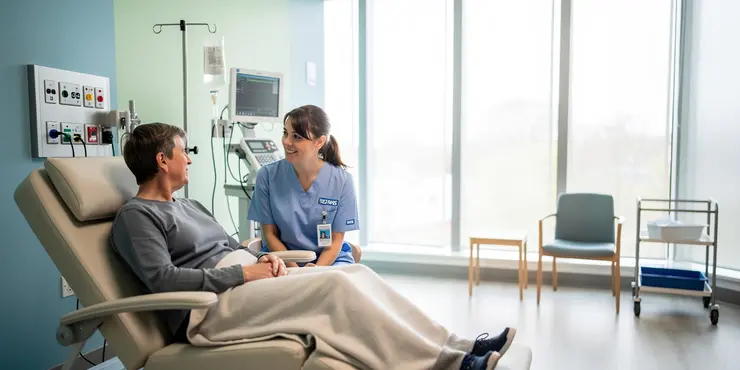
Having chemotherapy and other treatments in the Day Treatment Unit
Relevance: 100%
-
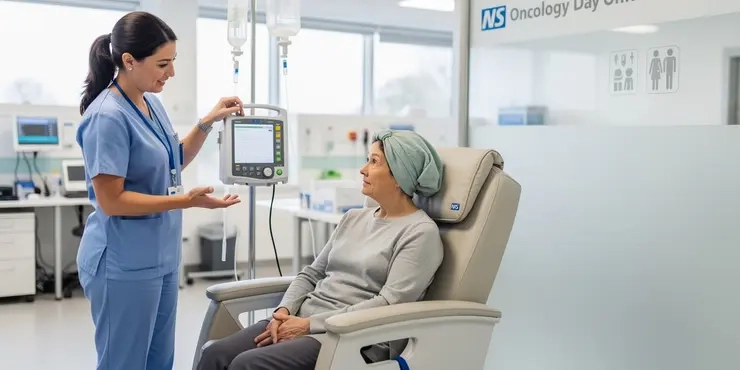
Chemotherapy
Relevance: 54%
-
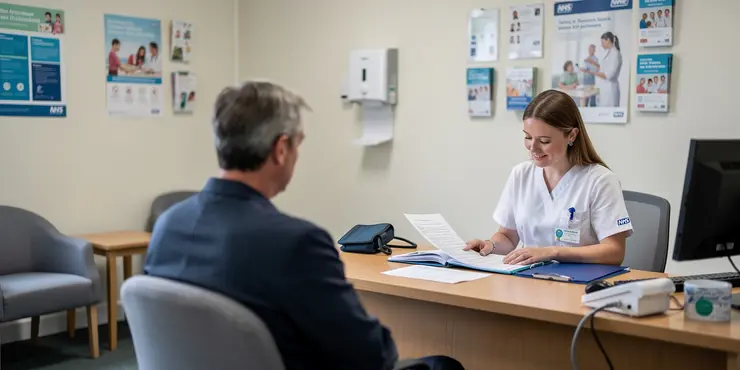
Is Paillon treatment a form of chemotherapy?
Relevance: 52%
-
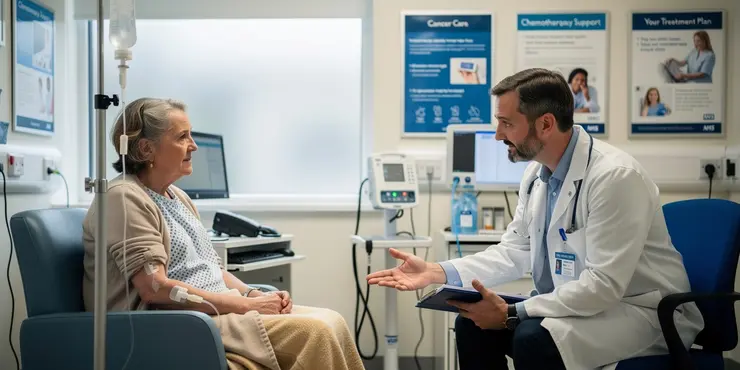
Chemotherapy - the patient journey
Relevance: 50%
-
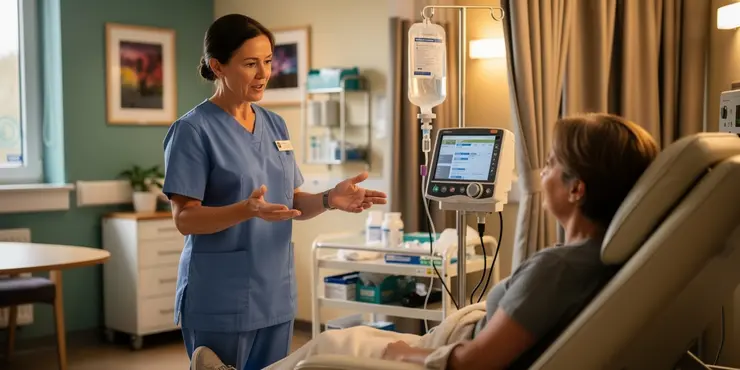
Chemotherapy - The Queen's Centre
Relevance: 46%
-
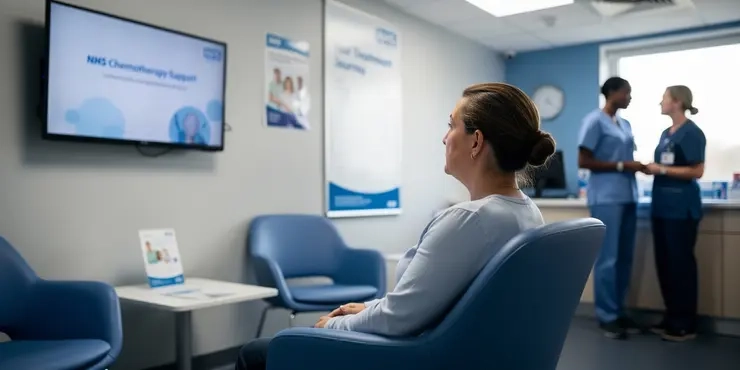
Pre chemotherapy Information Video
Relevance: 45%
-
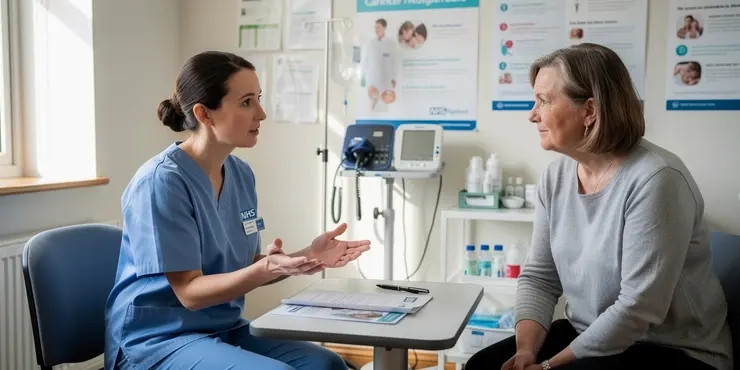
Introduction to Chemotherapy, NHS Highland
Relevance: 44%
-
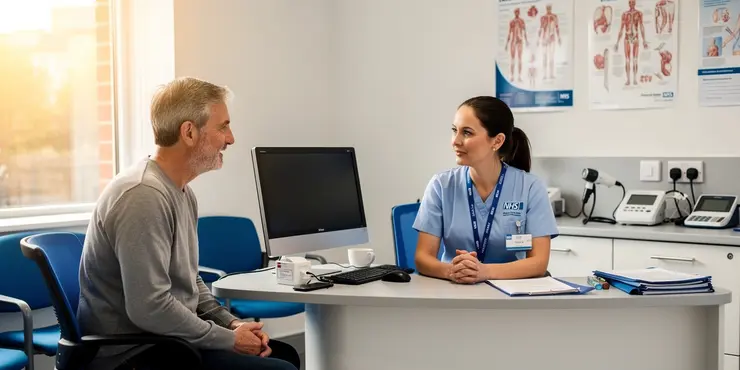
Is Abiraterone a chemotherapy drug?
Relevance: 44%
-
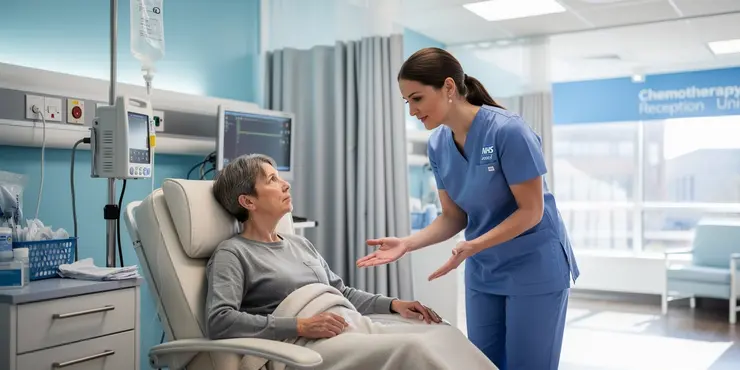
When is chemotherapy used for prostate cancer?
Relevance: 42%
-
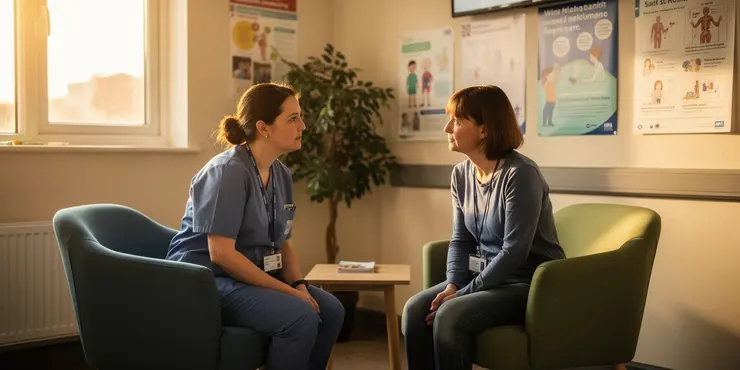
World Pancreatic Cancer Day - No Time to Wait
Relevance: 38%
-
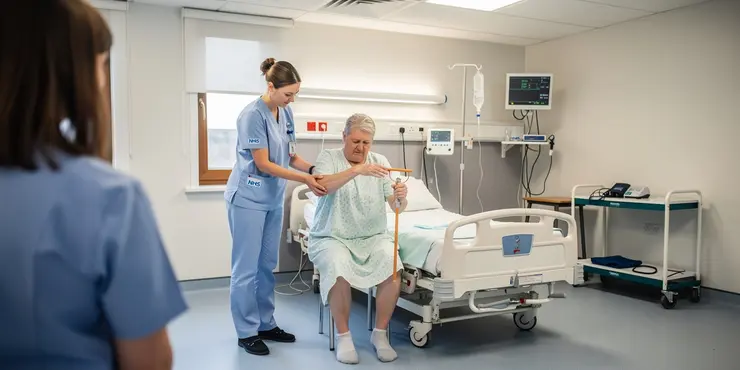
Vale Stroke Unit
Relevance: 36%
-
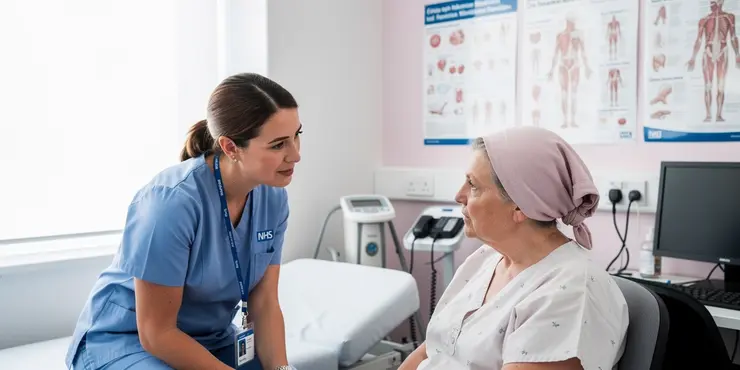
Information for all cancer patients receiving Chemotherapy or Targeted Therapy at HDFT.
Relevance: 36%
-
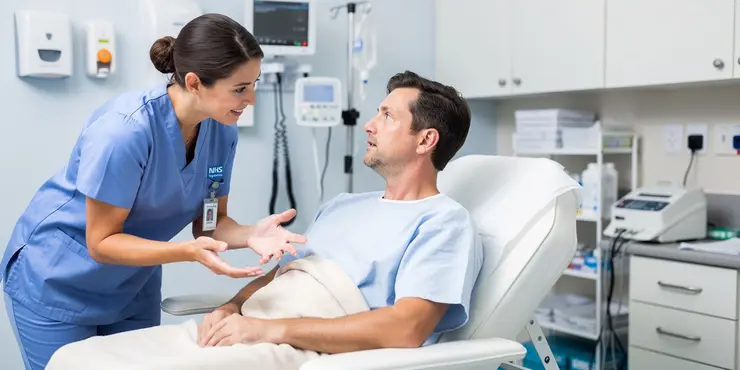
Your Visit to the Endoscopy Unit at NHS Tayside
Relevance: 34%
-
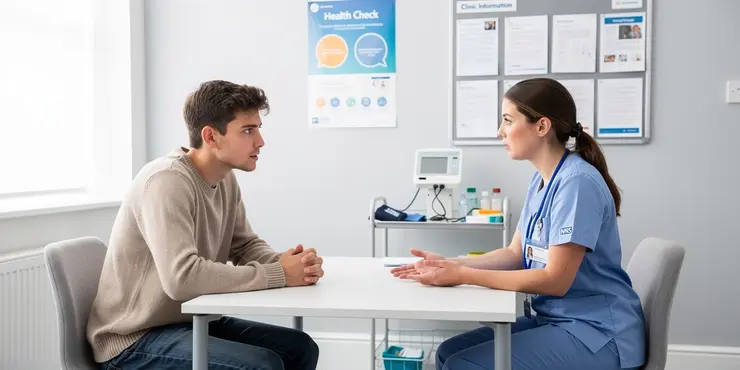
What types of treatments are available for testicular cancer?
Relevance: 32%
-
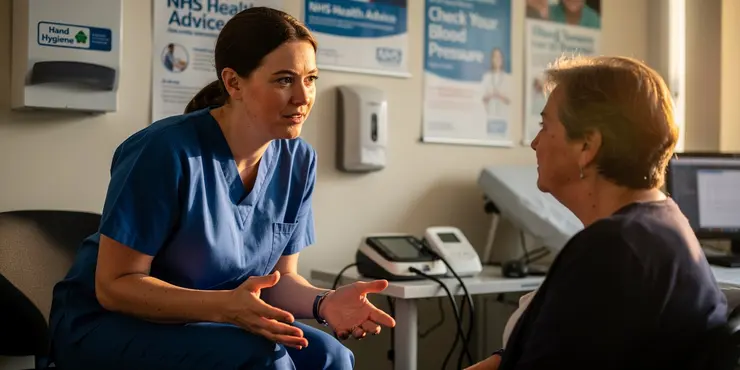
Are there mosquitoes in the United Kingdom?
Relevance: 31%
-
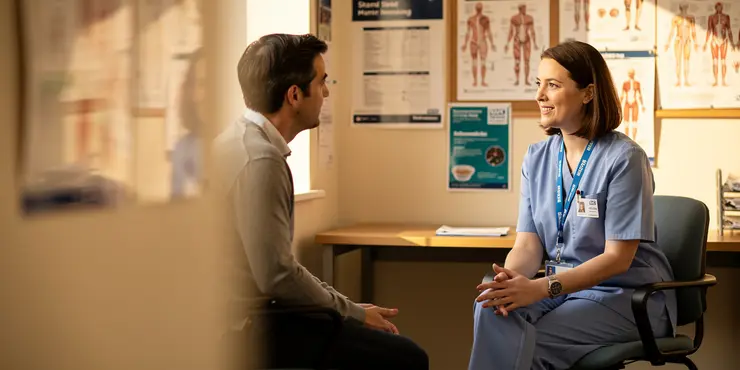
What treatment options are available for bowel cancer?
Relevance: 31%
-
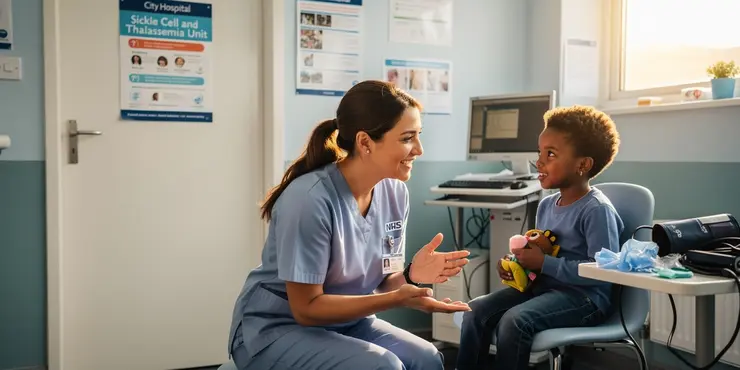
Tour of the Sickle Cell and Thalassaemia Unit at City Hospital | SCaT
Relevance: 30%
-
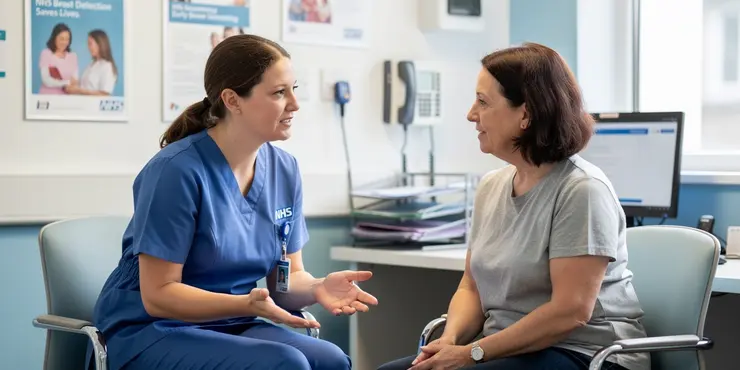
Breast cancer: testing and treatment | NHS
Relevance: 29%
-
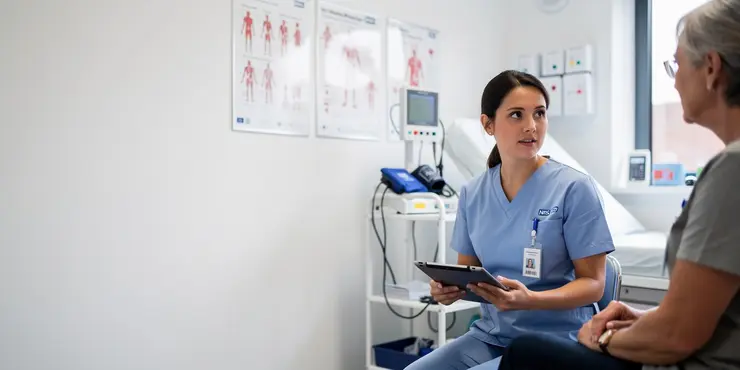
Are there Mosquitos in the United Kingdom?
Relevance: 28%
-
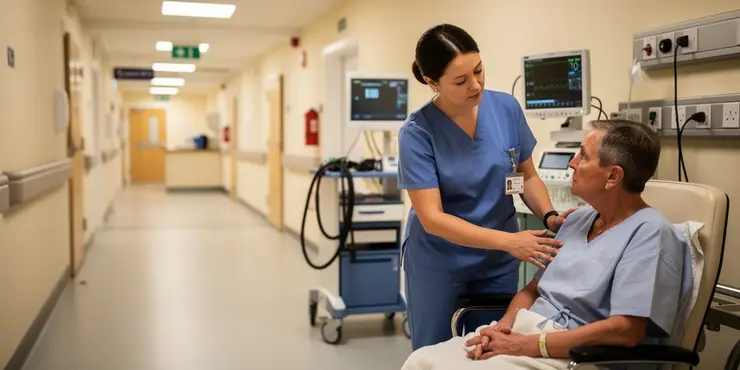
Endoscopy Unit
Relevance: 28%
-

Is ketamine considered a controlled substance in the United States?
Relevance: 28%
-
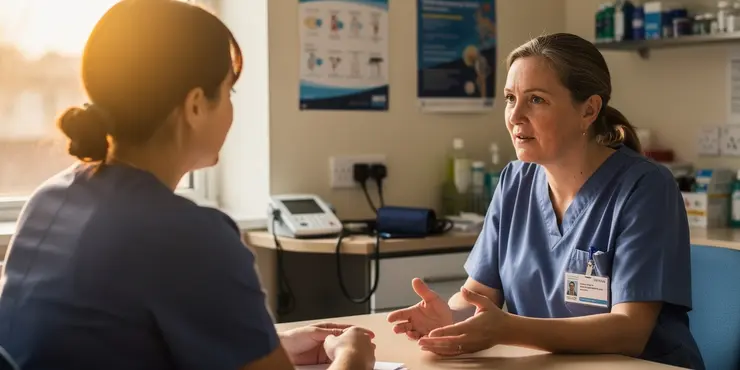
What are the side effects of bowel cancer treatment?
Relevance: 28%
-
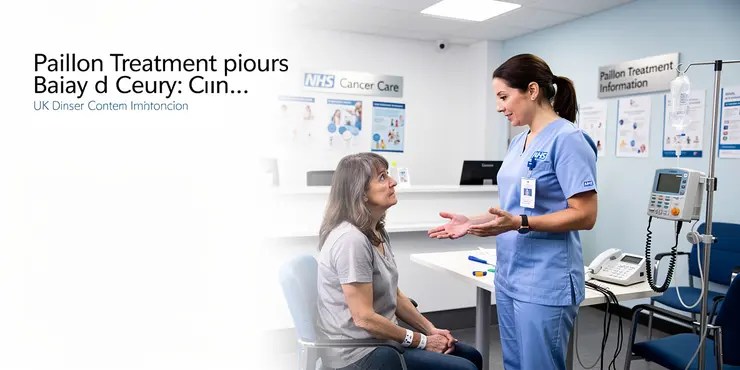
What is Paillon treatment for cancer?
Relevance: 27%
-
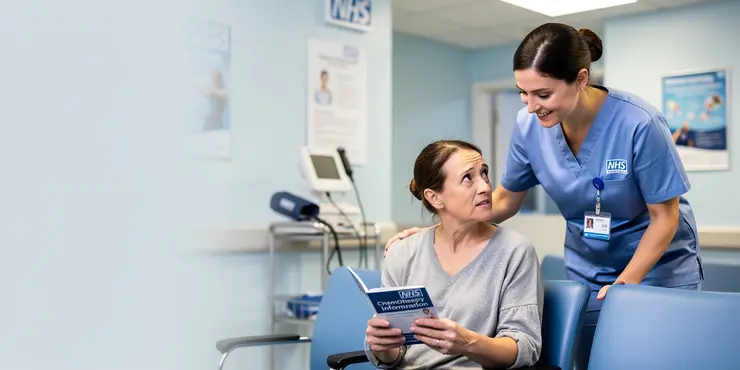
Starting Chemotherapy
Relevance: 27%
-
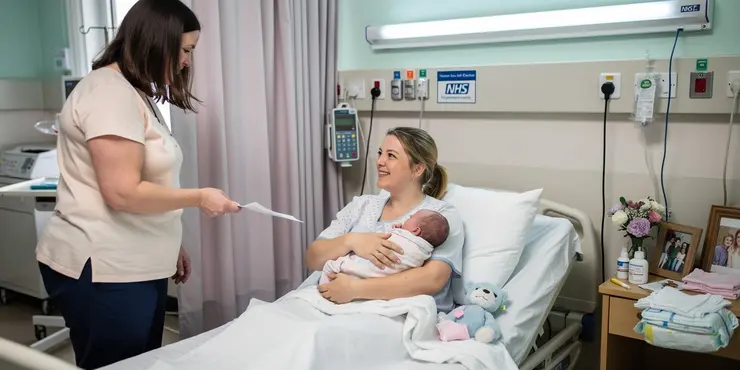
Can I have visitors on the first day?
Relevance: 27%
-
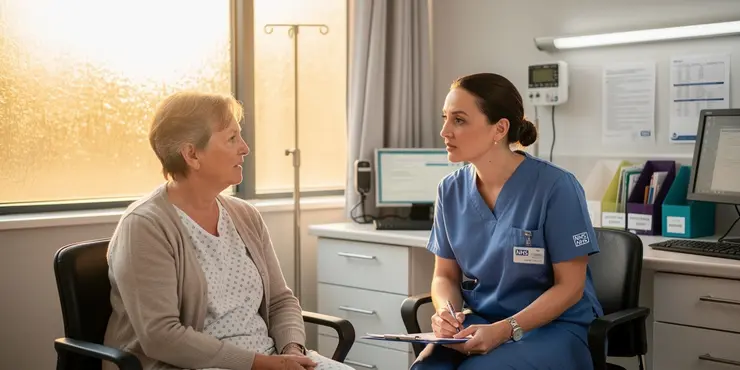
Breakthrough Cancer Treatment Shows Promise for NHS Patients
Relevance: 26%
-
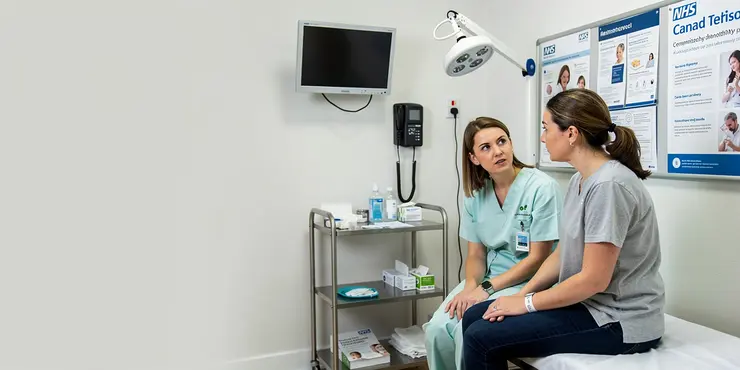
What is Radiotherapy, and its use in treatment for cancers?
Relevance: 26%
-

Is childhood obesity a concern in the United Kingdom?
Relevance: 25%
-
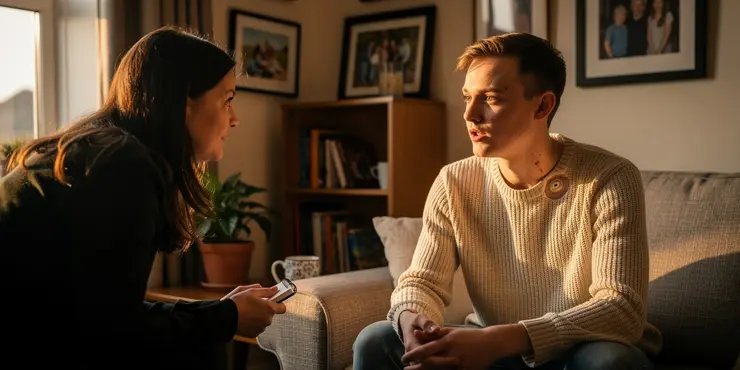
An Interview With JC About His Leukemia And His Leukemia Treatment
Relevance: 25%
-
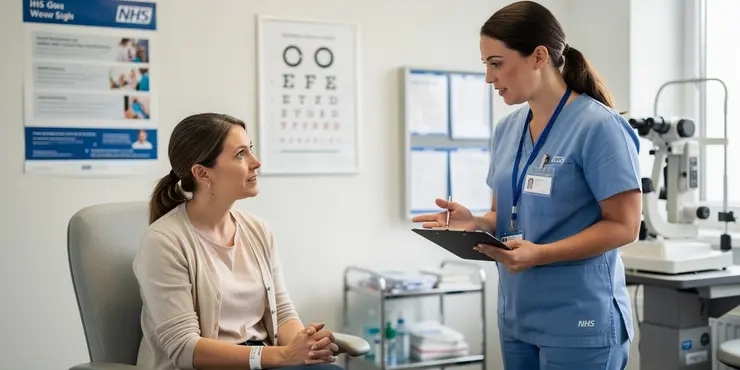
On the day of your cataract surgery
Relevance: 25%
-

Do I need sunscreen on cloudy days?
Relevance: 25%
-
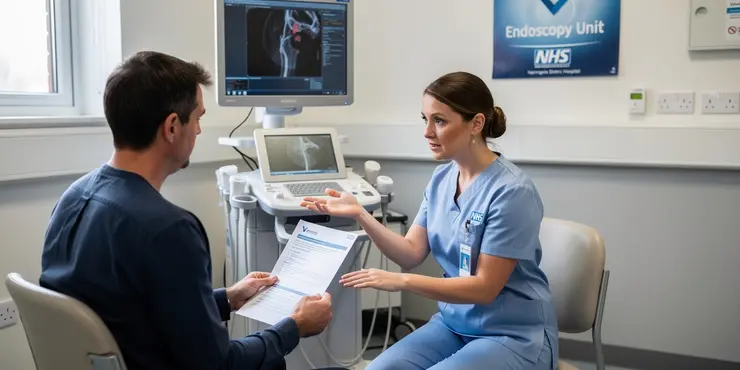
Coming to the Endoscopy Unit at Harrogate District Hospital
Relevance: 24%
-
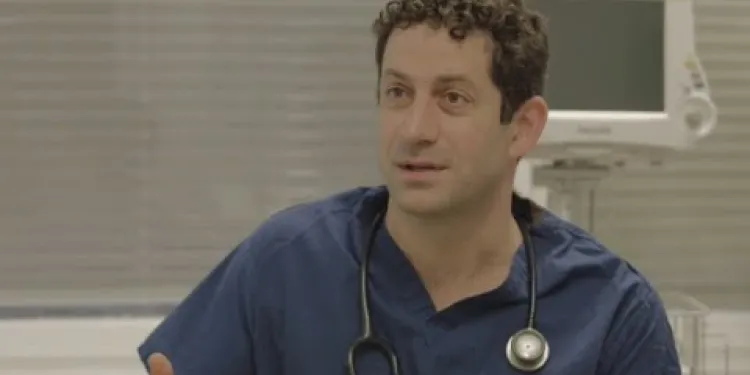
What to expect on the day of your operation
Relevance: 24%
-
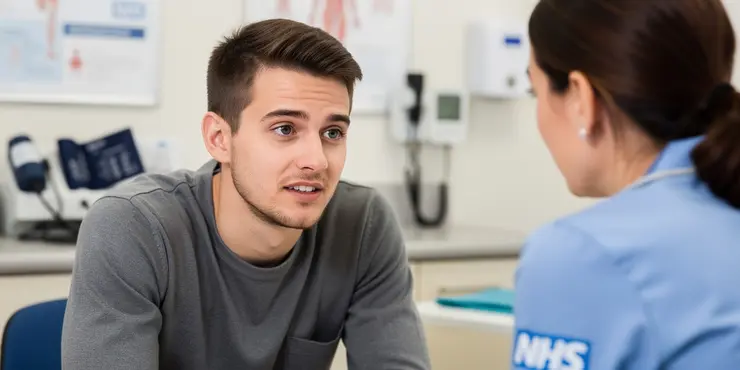
Can testicular cancer recur after treatment?
Relevance: 23%
-
Is it okay to drink orange juice every day?
Relevance: 22%
-
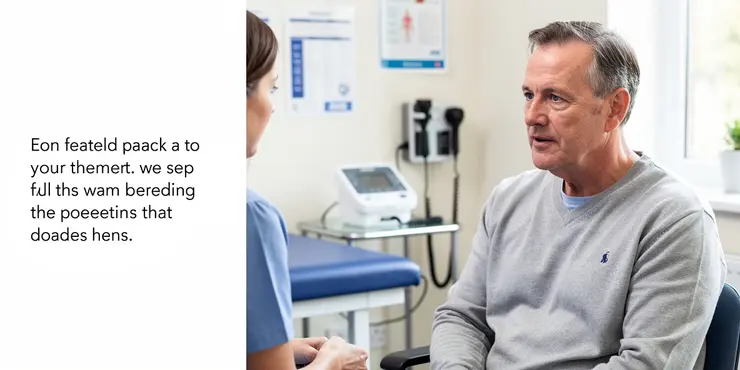
Can prostate cancer recur after treatment?
Relevance: 22%
-
Undergoing day case surgery at University Hospitals Bristol
Relevance: 22%
-
Is there a treatment for measles?
Relevance: 22%
-
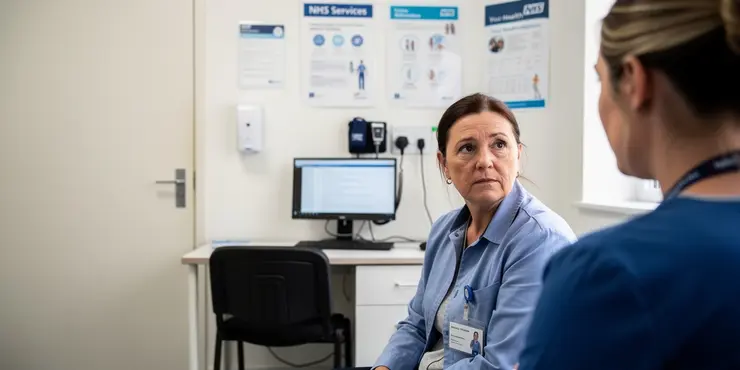
Does Paillon treatment treat all types of cancer?
Relevance: 22%
-
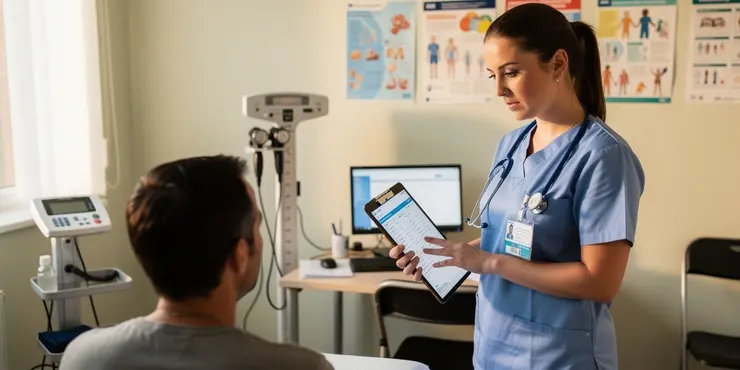
What to expect on the first day in a British prison.
Relevance: 21%
Having Chemotherapy and Other Treatments in the Day Treatment Unit
Introduction to the Day Treatment Unit
The Day Treatment Unit (DTU) is a specialized facility within hospitals across the United Kingdom dedicated to providing chemotherapy and other cancer-related treatments. These units are designed to offer a streamlined, efficient, and comfortable treatment experience for patients, allowing them to receive care on an outpatient basis. This structure minimizes the need for overnight hospital stays and helps patients maintain their daily routines as much as possible.
What to Expect During Your Visit
When you arrive at the Day Treatment Unit, you will be greeted by a team of healthcare professionals, including nurses, doctors, and support staff who specialize in oncology. They will guide you through the process, from registration to receiving your treatment. Your visits will often start with a blood test to check your health status and ensure that it is safe to proceed with chemotherapy or other treatments.
Receiving Chemotherapy
Chemotherapy involves administering drugs to destroy cancer cells. In the DTU, chemotherapy is typically delivered intravenously, but it can also be given orally or through injections. You will be seated in a comfortable chair, and the staff will monitor you closely throughout the session to manage any side effects promptly. The length of each chemotherapy session varies, depending on the specific treatment plan designed by your oncologist.
Additional Treatments Offered
Aside from chemotherapy, the DTU may offer other treatments such as immunotherapy, targeted therapy, blood transfusions, and supportive care therapies like hydration or antibiotic infusions. Each of these treatments aims to address different aspects of cancer management and patient well-being. Your healthcare team will provide detailed information on the specific treatments you will receive and their purposes.
Managing Side Effects
Side effects are a common concern for many undergoing cancer treatment. The staff at the DTU is experienced in managing and mitigating side effects, ensuring your comfort and safety. They will provide you with information and medications to deal with common issues like nausea, fatigue, or infections. Don't hesitate to communicate any discomfort or symptoms you experience during your visit.
Support and Resources
The DTU offers more than just medical treatments; it also provides access to various support resources, including counseling services, nutritional guidance, and support groups. These resources can help you cope with the emotional and physical challenges of cancer treatment. Many units also work closely with charities and local support organizations to provide comprehensive care.
Conclusion
The Day Treatment Unit in the UK is a vital resource for those undergoing chemotherapy and other cancer treatments. By offering specialized care in a convenient outpatient setting, these units help patients manage their treatments effectively while maintaining a higher quality of life. Remember, the healthcare team is always there to support you, so feel free to ask questions and express your needs during your visit.
Having Chemotherapy and Other Treatments in the Day Treatment Unit
About the Day Treatment Unit
The Day Treatment Unit (DTU) is a special place in hospitals in the UK. It helps people get chemotherapy and other cancer treatments. At the DTU, you do not have to stay overnight. You can go home afterward. This helps you keep doing your daily activities as much as you can.
What Will Happen When You Visit
When you go to the Day Treatment Unit, you will meet nurses, doctors, and other helpers. They know a lot about cancer treatment. They will help you from the moment you arrive until you finish your treatment. You might start your visit with a blood test. This helps make sure it’s safe for you to have treatment that day.
Getting Chemotherapy
Chemotherapy uses medicine to kill cancer cells. In the DTU, you often get this through a drip in your vein, but you might also take pills or have injections. You will sit in a comfy chair while the treatment is given. The staff will watch you to make sure you are okay. Each session might take a different amount of time. Your doctor will decide the best plan for you.
Other Treatments You Might Have
Besides chemotherapy, you might get other treatments like immunotherapy, targeted therapy, or blood transfusions. You might also get extra care, like fluids or antibiotics, if you need them. These treatments help in different ways with your cancer and well-being. Your healthcare team will explain each one to you.
Handling Side Effects
Sometimes, treatments can make you feel unwell. The DTU staff knows how to help with side effects and will make sure you are comfortable. They will give you advice and medicines if you feel sick, tired, or have any infections. Always tell them if something bothers you or if you feel unwell.
Help and Support
At the DTU, you can get more than just medicines. You can talk to counselors, get advice about eating well, and join support groups. These resources can make it easier to handle cancer treatment. The DTU works with charities and other groups to give you lots of support.
Summary
The Day Treatment Unit in the UK is very helpful for people getting cancer treatment like chemotherapy. You get special care during the day and go home afterward. This setup helps you live as comfortably as possible during treatment. Remember, the healthcare team is there to help you, so always ask questions and tell them what you need while you’re there.
Frequently Asked Questions
What should I bring with me to the Day Treatment Unit for chemotherapy?
You should bring comfortable clothing, any current medications, personal identification, a book or electronic device for entertainment, and light snacks if desired. The unit will provide most medical necessities.
How long will my chemotherapy session take?
The duration of a chemotherapy session can vary depending on the type of treatment you are receiving. It can take anywhere from 30 minutes to several hours. Your healthcare team will provide a more precise time estimate.
Can I bring someone with me to my treatment sessions?
Yes, you are usually allowed to bring one person to accompany you during your treatment sessions. However, it's best to check with the Day Treatment Unit as policies may vary, especially during health crises like the COVID-19 pandemic.
Will I experience side effects immediately after my chemotherapy treatment?
Some people experience side effects immediately, while others may notice them days or even weeks later. Common side effects include tiredness, nausea, and hair loss, but these can vary based on the type of chemotherapy you are receiving.
What measures are in place to manage pain or discomfort during treatment?
The medical staff will monitor you closely and can provide medications to manage pain or discomfort. Always inform your nurse or doctor about any pain or side effects you are experiencing.
Are there food and drink facilities available in the Day Treatment Unit?
Many Day Treatment Units offer light refreshments such as tea, coffee, and biscuits. You may also want to bring your own snacks and drinks for added comfort.
What should I do if I feel unwell in between treatment sessions?
If you feel unwell between treatments, contact your medical team or the emergency contact provided. They can provide advice on how to manage your symptoms and decide if you need immediate care.
Can I drive myself to and from the Day Treatment Unit?
It's usually recommended to have someone drive you to and from your treatment, especially if it's your first session, because the effects of chemotherapy and medications can make you feel unwell or drowsy.
How should I prepare for my first chemotherapy session?
Before your first treatment, eat a light meal and drink plenty of fluids. Wear comfortable clothing and bring any necessary personal items like medication and identification. Arrive early to allow for a smooth check-in process.
Will I need to follow a specific diet during chemotherapy?
While no specific diet is universally required, it's important to eat a balanced diet to maintain strength and energy. Your healthcare team can provide dietary guidelines based on your individual needs.
Can I continue working while receiving chemotherapy?
Many people are able to continue working, but it depends on the type of treatment and how you tolerate it. Discuss your work schedule with your healthcare team to make appropriate adjustments.
What kind of follow-up care should I expect after my chemotherapy sessions?
Follow-up care usually includes regular appointments to monitor your health and the effectiveness of the treatment. Blood tests and imaging may be done periodically to assess your progress.
Are there support services available for patients undergoing chemotherapy?
Yes, many hospitals offer support services such as counselling, support groups, and nutritional advice. Ask your healthcare provider for information on the services available to you.
Will my chemotherapy treatment schedule remain the same throughout my treatment course?
Your treatment schedule might change based on your body's response to chemotherapy. Your doctor will adjust the plan as needed to ensure the best possible outcomes.
What do I need to do if I miss a chemotherapy appointment due to illness or other reasons?
Contact your Day Treatment Unit or healthcare provider as soon as possible. They will help reschedule your appointment and provide guidance on any interim steps you need to take.
What to Bring for Chemotherapy Day
Bring comfy clothes, your medicine, something that shows who you are (like an ID card), and a book or tablet to keep busy. You can also bring snacks if you want. The place will have most things you need for medical care.
How long will my chemotherapy session take?
Chemotherapy is a treatment for cancer. It uses strong medicine to kill cancer cells. A chemotherapy session is when you get this medicine.
Your chemotherapy session time can be different. It can be short, or it can take a few hours. The doctor or nurse will tell you how long it will be.
If you are worried or have questions, you can ask your doctor or nurse. They are there to help you. You can also write down your questions so you don’t forget them.
Chemotherapy is a type of medicine to help you get better. It can take different amounts of time. Sometimes it takes 30 minutes. Sometimes it takes a few hours. Your doctor or nurse will tell you how long your treatment will take.
If you need help understanding this, you can ask someone you trust to explain it. You can also use a timer to keep track of time during your treatment.
Can I bring someone with me when I go for my treatment?
Yes, you can! Bringing a friend or family member can help you feel better. It can make you feel more comfortable and supported.
Here are some tips to help:
- Ask the clinic if it's okay first. Some places have rules about visitors.
- Choose someone you trust. It's important you feel safe with them.
- Tell the person what to expect. They might need to know what will happen during the treatment.
You can usually bring one person with you when you go for your treatment. But, it is a good idea to ask the Day Treatment Unit first. Rules might be different, especially during times like the COVID-19 pandemic.
Will I feel side effects right after my chemotherapy treatment?
Some people feel side effects right away. Others might notice them days or weeks later. Common side effects are feeling tired, feeling sick, and losing hair. These can be different based on the kind of treatment you get.
If you find reading hard, you can ask someone to read with you. Point to each word as you read. This can help you keep focus.
Using apps or audiobooks to listen to the text might also help.
How do doctors help if I feel hurt or uncomfortable during treatment?
The doctors and nurses will watch you closely. They can give you medicine to help if you feel pain or feel bad. Always tell your nurse or doctor if you have any pain or problems. It is important to speak up!
Can I get food and drinks in the Day Treatment Unit?
Day Treatment Units have some drinks and snacks like tea, coffee, and biscuits. You can bring your own snacks and drinks if you want.
What to do if you feel sick between doctor visits?
If you feel sick between your visits to the doctor, here is what you can do:
- Tell an adult you trust, like a parent or caregiver.
- Call your doctor for advice.
- Write down your symptoms and when they happen.
- Rest and drink lots of water.
- Take medicine if your doctor says it is okay.
Feel better and get help if you need it!
If you feel sick between your treatments, call your doctor or the emergency number they gave you. They can tell you what to do to feel better and see if you need help right away.
Can I drive myself to the Day Treatment Unit and back home?
It means: Can you drive your car to the place where you get care and then drive back home?
To help you understand and remember:
- Use simple words.
- Ask someone to explain it to you.
- Draw a picture about the question.
It is a good idea to have someone with you to drive you to your treatment and back home. This is really important if it is your first time. The medicine can make you feel sick or sleepy.
How can I get ready for my first chemotherapy session?
Here are some simple tips to help you get ready:
- Bring a Friend: Ask someone to come with you to the hospital. They can help and keep you company.
- Wear Comfy Clothes: Put on loose and cozy clothes. This will help you feel more at ease.
- Pack Snacks: Take some snacks and drinks. Sometimes, treatments can take a while.
- Entertainment: Bring a book, music, or games to keep yourself busy. This can make the time go by faster.
- Ask Questions: Don’t be shy to ask the nurse or doctor anything you don't understand. They are there to help you.
These tips can help make your first day of treatment better!
Before your first visit, eat a small meal and drink lots of water. Wear comfy clothes. Bring important things like medicine and your ID card. Get there early so everything goes smoothly.
Do I need to eat special food during chemotherapy?
Yes, it is good to eat healthy food when you are having chemotherapy. Here are some tips to help you:
- Eat lots of fruits and vegetables.
- Choose foods with protein like chicken, fish, and beans.
- Drink plenty of water.
- If you feel sick, try eating small meals often.
- Ask a doctor or nurse if you need help with what to eat.
- Use tools like picture menus or apps to help you choose food.
There isn't one special diet that everyone needs to follow. But it is important to eat a mix of healthy foods to stay strong and have energy. Your doctor or nurse can tell you what foods are best for you.
Can I keep working while having cancer treatment?
If you are getting medicine for cancer called chemotherapy, you might be able to keep working. This depends on how you feel. Some people feel okay and go to work. Others might feel too tired or sick. It is important to talk to your doctor about how you feel and what you want to do.
If you decide to work, here are some things that might help:
- Talk to your boss about working part-time or flexible hours.
- Take breaks when you need to rest.
- Ask for help if some tasks are too hard.
- Use reminders to help you remember important things.
Remember, it is okay to rest if you need to. Your health is most important.
Lots of people can keep working. It depends on the kind of treatment you get and how it makes you feel. Talk to your doctor or nurse about your work. They can help you make changes to your schedule if you need to.
What happens after my chemo treatments? What care will I get?
After your treatment, you need to see the doctor regularly. This is to check how you are doing and if the treatment is working. The doctor might do blood tests and take pictures of the inside of your body to see how you are getting on.
Can people going through chemotherapy get help?
Yes, lots of hospitals can help with extra services.
They have things like talking with a counsellor, meeting in support groups, and getting advice about eating well.
To find out what you can get, ask your doctor or nurse.
Will my chemotherapy treatment stay the same the whole time?
Will I have the same treatment plan every time I go for chemotherapy?
If you are not sure, ask your nurse or doctor.
It is okay to ask questions and tell them how you are feeling.
Your treatment plan might change based on how your body handles the medicine. Your doctor will change things if needed to make sure you get the best help.
What should I do if I miss my chemo session because I'm sick or for other reasons?
If you can't go to your chemo session because you are sick or have another problem, don't worry. Here’s what you can do:
- Call the doctor: Use the phone to tell your doctor or the hospital that you can't come.
- Make a new appointment: Ask the doctor or nurse when you can come in to have your chemo session.
- Write it down: Use a calendar or a notebook to remember your new appointment date and time.
- Ask for help: If you need support, talk to a family member or friend who can help remind you about your appointments.
These steps will help you to keep on track with your treatment. Remember, it's okay to ask others for help!
Talk to your Day Treatment Unit or healthcare provider right away. They will help you make a new appointment. They will also tell you what to do while you wait for the new appointment.
Useful Links
This website offers general information and is not a substitute for professional advice.
Always seek guidance from qualified professionals.
If you have any medical concerns or need urgent help, contact a healthcare professional or emergency services immediately.
Some of this content was generated with AI assistance. We’ve done our best to keep it accurate, helpful, and human-friendly.
- Ergsy carfully checks the information in the videos we provide here.
- Videos shown by Youtube after a video has completed, have NOT been reviewed by ERGSY.
- To view, click the arrow in centre of video.
- Most of the videos you find here will have subtitles and/or closed captions available.
- You may need to turn these on, and choose your preferred language.
- Go to the video you'd like to watch.
- If closed captions (CC) are available, settings will be visible on the bottom right of the video player.
- To turn on Captions, click settings .
- To turn off Captions, click settings again.
More Items From Ergsy search
-

Having chemotherapy and other treatments in the Day Treatment Unit
Relevance: 100%
-

Chemotherapy
Relevance: 54%
-

Is Paillon treatment a form of chemotherapy?
Relevance: 52%
-

Chemotherapy - the patient journey
Relevance: 50%
-

Chemotherapy - The Queen's Centre
Relevance: 46%
-

Pre chemotherapy Information Video
Relevance: 45%
-

Introduction to Chemotherapy, NHS Highland
Relevance: 44%
-

Is Abiraterone a chemotherapy drug?
Relevance: 44%
-

When is chemotherapy used for prostate cancer?
Relevance: 42%
-

World Pancreatic Cancer Day - No Time to Wait
Relevance: 38%
-

Vale Stroke Unit
Relevance: 36%
-

Information for all cancer patients receiving Chemotherapy or Targeted Therapy at HDFT.
Relevance: 36%
-

Your Visit to the Endoscopy Unit at NHS Tayside
Relevance: 34%
-

What types of treatments are available for testicular cancer?
Relevance: 32%
-

Are there mosquitoes in the United Kingdom?
Relevance: 31%
-

What treatment options are available for bowel cancer?
Relevance: 31%
-

Tour of the Sickle Cell and Thalassaemia Unit at City Hospital | SCaT
Relevance: 30%
-

Breast cancer: testing and treatment | NHS
Relevance: 29%
-

Are there Mosquitos in the United Kingdom?
Relevance: 28%
-

Endoscopy Unit
Relevance: 28%
-

Is ketamine considered a controlled substance in the United States?
Relevance: 28%
-

What are the side effects of bowel cancer treatment?
Relevance: 28%
-

What is Paillon treatment for cancer?
Relevance: 27%
-

Starting Chemotherapy
Relevance: 27%
-

Can I have visitors on the first day?
Relevance: 27%
-

Breakthrough Cancer Treatment Shows Promise for NHS Patients
Relevance: 26%
-

What is Radiotherapy, and its use in treatment for cancers?
Relevance: 26%
-

Is childhood obesity a concern in the United Kingdom?
Relevance: 25%
-

An Interview With JC About His Leukemia And His Leukemia Treatment
Relevance: 25%
-

On the day of your cataract surgery
Relevance: 25%
-

Do I need sunscreen on cloudy days?
Relevance: 25%
-

Coming to the Endoscopy Unit at Harrogate District Hospital
Relevance: 24%
-

What to expect on the day of your operation
Relevance: 24%
-

Can testicular cancer recur after treatment?
Relevance: 23%
-
Is it okay to drink orange juice every day?
Relevance: 22%
-

Can prostate cancer recur after treatment?
Relevance: 22%
-
Undergoing day case surgery at University Hospitals Bristol
Relevance: 22%
-
Is there a treatment for measles?
Relevance: 22%
-

Does Paillon treatment treat all types of cancer?
Relevance: 22%
-

What to expect on the first day in a British prison.
Relevance: 21%


